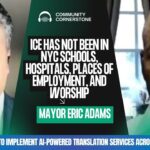In a recent interview with NepYork, Mayor Eric Adams outlined his administration’s commitment to supporting New York City’s immigrant community, including the growing Nepali community, and addressing key issues such as immigrant protections and language barriers. The mayor, who expressed admiration for the Nepali community in New York, detailed new initiatives aimed at making city services more accessible and ensuring the community feels secure and supported.
Mayor Adams addressed concerns among immigrant communities, including Nepalis, regarding his relationship with the White House. He emphasized that his goal is not to “war with the White House but to work with them to get the services we deserve.”
He cited a successful collaboration on a wind farm project that saved 1,500 union jobs, while also noting instances where the city has challenged the federal government. “We have taken the White House to court more than any administration in the country,” he stated. “And the White House has sued us. We have been sued several times by the White House.”
Adams also addressed fears about the presence of U.S. Immigration and Customs Enforcement (ICE). He stated that the city has been able to communicate with federal authorities to tell them it is “better not to disrupt the lives of individuals who are doing what’s right.”
He told the community that “ICE has not been in our schools, they have not been in our houses of worship, they have not gone to our hospitals or our places of employment.”
He explained that while the city will coordinate with federal authorities on “criminal enforcement to deal with those who are dangerous,” it will “use the courts to get the overturning of any policy that we believe is harmful” where it disagrees with the federal government.
He stressed that his administration is dedicated to protecting all New Yorkers, regardless of immigration status. “We are going to make sure that undocumented children are safe, that they are able to be educated in our schools,” he said.
He also highlighted that all city services, from police protection to hospital care, are available to residents because they pay taxes, regardless of their status. “The symbiotic relationship is that those taxes go to pay for police protection when you need it,” he explained.
The mayor revealed a significant new plan to tackle language barriers, a challenge faced by many immigrants and nearly half of all Nepali Americans who struggle with English. He announced upcoming pilot programs that will integrate artificial intelligence (AI) translation devices, such as ChatGPT, into key city agencies.
“Yesteryear, where you had to call the language line or find someone to interpret your language, those days are over,” Adams said. The initial rollout will focus on the New York Police Department and city schools, with plans to expand to every agency.
Adams believes this “game changer” will empower non-English-speaking residents to access services without fear of embarrassment or misunderstanding. “There’s no reason a Nepali contractor should not be able to walk into the Department of Buildings, speak, and communicate through some form of either Google Translate, ChatGPT, or any other,” he noted.
Responding to concerns about the financial struggles of ethnic media outlets, Adams reaffirmed the city’s commitment to Local Law 83, which requires agencies to spend at least 50% of their advertising budget on ethnic and community media. He pledged to ensure continued support for these vital information lifelines.
“I think that the ethnic media plays such a vital role in ensuring that all New Yorkers are aware of what the city is providing,” he said, vowing to fight to uphold the law and prevent smaller voices from being left behind.


